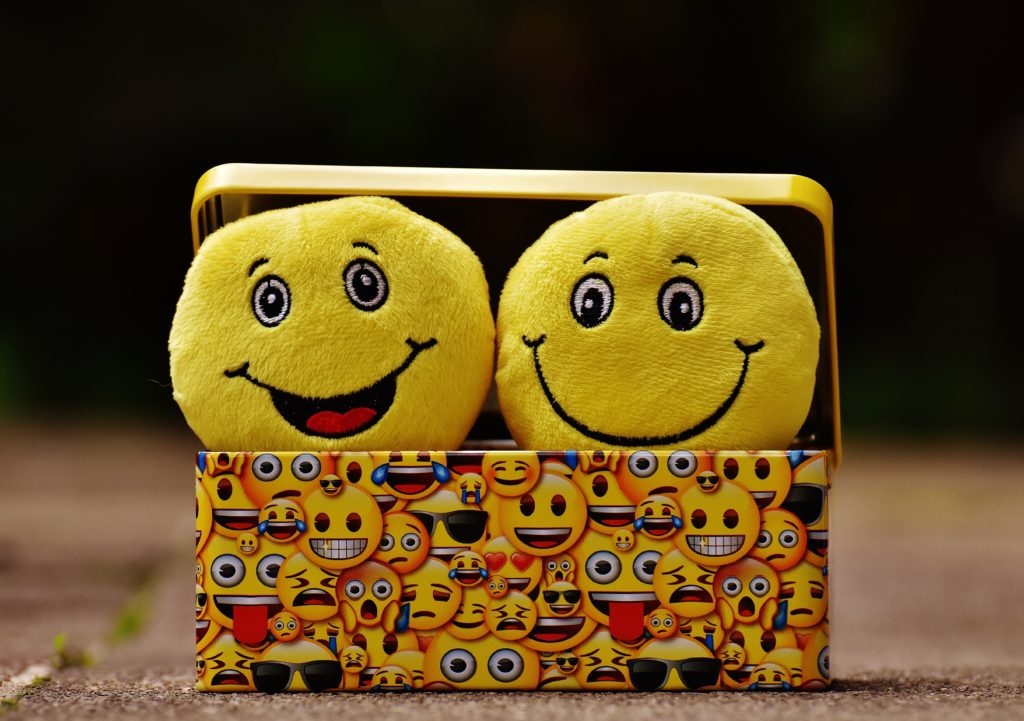
Quick Hits:
– There are 6 basic emotions that are consistent across all intersections of humanity.
– We are likely to feel all of them, to some degree, each day.
– For optimum wellness, think of emotions as data rather than states of being.
– Let your emotions stay with you for a healthy amount of time.
Did you know there are six universal emotions? This idea is related to the research of Paul Ekman who studied humans across diverse demographic intersections and determined that there are six emotions that we all feel and express in the same ways. They are:
- Joy (Sometimes referred to as ‘Happiness’) – symbolized by raising of the mouth corners (an obvious smile) and tightening of the eyelids
- Surprise – symbolized by eyebrows arching, eyes opening wide and exposing more white, with the jaw dropping slightly
- Sadness – symbolized by lowering of the mouth corners, the eyebrows descending to the inner corners and the eyelids drooping
- Anger – symbolized by eyebrows lowering, lips pressing firmly and eyes bulging
- Disgust – symbolized by the upper lip raising, nose bridge wrinkling and cheeks raising
- Fear – symbolized by the upper eyelids raising, eyes opening and the lips stretching horizontally
https://www.kairos.com/blog/the-universally-recognized-facial-expressions-of-emotion
I have found this research to be helpful as it has informed the way I think about emotions. If there are six universal emotions that, as a human being, I’m going to feel to some degree each day, then I can be intentional about how I let them in and out of my life. Here’s what I mean…
Too often we let our emotions dictate our behaviors without a second thought. We talk about them and treat them as states of being, saying something like, “I’m angry”. My experience is that it is more useful to us to view emotions as data, rather than states of being.
By doing this, “I’m angry” becomes “I’m feeling anger.” With this data, we can notice emotions, process the information they are giving us, and make a choice about how they inform our behavior, rather than giving emotions the power to influence our behavior without consideration and/or for an unhealthy amount of time.
Here’s an example: I’m feeling angry with my partner for not helping with the kids/housework last night. If I recognize this anger as data, I give myself a good chance of effectively problem-solving in this situation. I would likely be able to have a conversation with my partner about how I was feeling, why I was feeling that way, and what we could do to avoid that in the future.
If I treat that anger as a state of being, rather than data, I might let it in my life for an unhealthy amount of time. If I hang on to that anger for too long I could ruin hours or days of my life resenting my partner without taking any productive action to improve the situation. If I ignore the data, or disallow it in my life for the right amount of time, my resentment will likely build and I am less likely to protect my needs and healthy boundaries in this relationship. But, if I let it inform me to a healthy extent, I can advocate for my needs without damaging the relationship or my feelings about them for myself.
Basically I’m suggesting that our emotions come into and out of our lives for the purpose of informing us. We should be mindful about letting them in our lives for the appropriate amount of time, and then letting them leave. We should not let them stay for too little or too long of a time.
More severe events in our lives, like a loss of life, break-up, or trauma naturally have longer stays in our lives. The data they provide take a longer time to process and inform our behaviors. But, as Ekman’s research indicates, most of us will feel the six universal emotions to some degree on a daily basis.
At our healthiest, we can acknowledge our emotions without judgment and let them inform our behaviors for the appropriate amount of time. If this feels like a challenge for you, you may benefit from some skill building work related to mindfulness techniques and/or emotional regulation. There are many great books and articles that can be found related to these ideas. Two that I like in particular are:
Mindfullness: A Practical Guide by Tessa Watt
The High Conflict Couple by Alan Fruzzetti
You can find out more about Paul Ekman’s research here: http://www.beinghuman.org/mind/paul-ekman
All my best to you as you make your progress,
Matt


